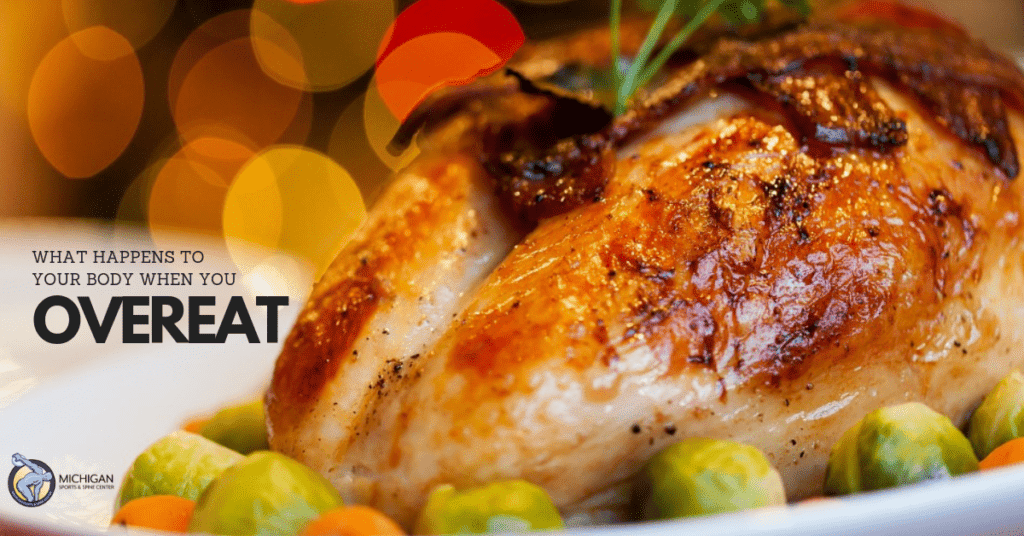What Happens to Your Body When You Overeat


With the Thanksgiving holiday upon us, we are already looking forward to watching football while fighting off the impending “Turkey Coma”. What we don’t realize is that it’s not the infamous Tryptophan, an amino acid found in poultry, that is causing our sleepiness. Turkey isn’t any more sleep-inducing than other foods. In fact, consuming large amounts of carbohydrates and alcohol may be the real cause of a post-Thanksgiving-meal snooze.
Now, we don’t want to ruin the big meal for you but we wanted to offer some “food for thought” when it comes to consuming more than a recommended serving. It’s okay to indulge once a year but if these overeating habits slip into our normal routine, weight gain and other health concerns will creep up quicker than you might think.
Portion control is often cited as one of the most effective tools for a well-regulated diet. Many American’s consistently overeat resulting in an estimated 70 percent of Americans falling into the category of overweight or obese.

With nearly every injury that we treat, weight loss is a part of the recovery plan. Outside of reduced stress on your muscles, tendons, and joints, weight loss also helps how we feel. Read on to understand what happens to our bodies when we overeat, the long-term effects of overeating and the best ways to prevent it from becoming an issue.
What Happens to Your Body When You Overeat.
- The stomach swells. When you eat too much, the stomach expands like a balloon to accommodate the large amount of food, which then pushes against the other organs in your body and makes you feel like you need to loosen your pants.
- You start feeling bloated and gassy. Every time you swallow food, air gets into the digestive tract, and that gas expands in the stomach, making it feel bloated. This sensation is exacerbated if you consume carbonated beverages with your meal. Burping is a common side effect of eating too much food because the buildup of gas needs to be released somehow.
- Heartburn starts to set in. The stomach produces hydrochloric acid to break down food, and, if you overeat, this may lead to a back up into the esophagus, resulting in heartburn (the more food you eat, the more acids needed to break down the food). You may be more prone to heartburn if you’re over-consuming foods that take longer to digest like greasy cheeseburgers and beer.
- Excess calories are stored. As food moves through your digestive tract and into the small intestine, where nutrients are absorbed, the liver and the pancreas begin to secrete enzymes to digest fats, carbs, and proteins. Cells in the intestinal walls absorb these macronutrients, along with vitamins and minerals, to be used for energy or storage. Excess calories that cannot be used for energy are stored as fat.
- Organs work overtime. Digesting a massive meal requires the organs to work in overdrive, secreting extra hormones and enzymes to break down the food. When this happens on the regular, issues can start to happen with metabolism and endocrine function, like insulin resistance, increased cortisol, and reduction in growth hormone.
- You may feel drowsy and tired. As the pancreas releases the hormone insulin, it sends off a cascade of hormones to be released. Serotonin and melatonin, the feel-good hormones, are released. This may make you feel tired and content.
- You feel nauseated. Leptin, a hormone that is produced by the fat cells, tells the brain that you’re no longer hungry and need to stop eating. If you eat too fast, you may miss this signal and continue eating past the feeling of fullness, causing the body to produce more leptin. People that have more fat cells in their bodies may develop leptin resistance, making it even harder to recognize fullness, and, ultimately, lose weight.

Long-Term Effects of Overeating
- When you eat, your body uses some of the calories you consume for energy. The rest is stored as fat. Consuming more calories than you burn may cause you to become overweight or obese. This increases your risk for cancer and other chronic health problems.
- Overeating — especially unhealthy foods — can take its toll on your digestive system. Digestive enzymes are only available in limited quantity, so the larger the amount of food you eat, the longer it takes to digest. If you overeat frequently, over time, this slowed digestive process means the food you eat will remain in the stomach for a longer period of time and be more likely to turn into fat.
- Overeating can even impact your sleep. Your circadian clock, which controls your sleep cycles, causes your sleep and hunger hormone levels to rise and fall throughout the day. Overeating can upset this rhythm, making it hard for you to sleep through the night.
The Best Ways to Stop Overeating?
- Eat sensibly throughout the day. Pay attention to your portion sizes.
Avoid processed foods which can be easily overeaten. - Fill up on fresh fruits and vegetables. They provide a lot of fiber and will keep you full between meals and decrease the need to snack.
- Eat from a salad plate instead of a dinner plate. This will help you control your portion size.
- Avoid distractions when you eat, such as watching TV, using the computer or other electronic devices. Focusing on the meal itself will allow you to be more aware of when you’re full.

- Eat slowly and put your fork down between bites. This mindful eating habit will slow you down and make it easier to realize when you’re full.
- Drink water before, during and after meals.
- Plan your meals ahead.
- Keep a food journal to help you notice any positive or negative habits.
ABOUT MICHIGAN SPORTS & SPINE CENTER:
We’re innovative leaders utilizing cutting-edge technologies such as musculoskeletal ultrasounds, PRP, stem cell treatment, and other innovative procedures. Michigan Sports & Spine Center is committed to resolving your pain, not simply masking it. We treat the whole body, not just the injury, and perform preventative treatment so your injury doesn’t come back. Our studies prove that Michigan Sports & Spine Center has patient success rates much higher than the national average. We treat everyone from high-profile athletes to your neighbor next door. Our primary focus is getting our patients back into the game of life!
Sources: WebMD, Everyday Health,
